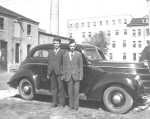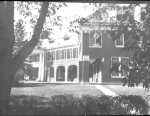| Page
1 | Page 2 | Page 3 | Page
4 | Page 5 | Page
6
Henry
Funk served in three medical facilities during the war.
“I
had two years of service in the Manitoba School for Mental Defectives
(Portage la Prairie), about 8 months at the St. Boniface Hospital
and 4 months (or so) at Bethania (a Mennonite home north of Winnipeg).
There was a significant group that did hospital work – both mental
hospital and general hospital.”
When
asked to describe his experiences in detail, he writes that he doesn't
“know where to begin here or where to stop.” The memories are so
strong and fresh that they run together.
“The
people in the Brandon Mental Hospital got psychiatric nurses training.
We did not at that time. The work soon became routine and boring,
though it was significant. The patients were generally not treated
as persons. I'm afraid we deteriorated to that too and very soon.
Even brutality was not unknown…. Generally, I feel we Mennonite
boys treated them with more kindness, and humaneness than did
some of the permanent staff….”
Henry's
first assignment was in the youth ward.
“The
first six months I was on duty in the “nursery” – some 20 patients
all infants – ages 4 to 22 – mentally crippled and physically
crippled – all in cribs of various sizes – all on diaper, powder,
feeding (spoon) routine.”
After
that, Henry spent time in the hospital's other areas. The tuberculosis
ward, for example, and the dormitory ward for those patients who
did work during the day in the gardens, fields, or dairy barn. Unlike
the other staff, Henry and his CO colleagues lived at the hospital.
"The
dorm life was wholesome. We were 14 fellows in an old, large residence
on the hospital compound. No dean, so we had our days – scrap
and wrestle like boys – eat 'knacksote' [sunflower seeds] till
the living room floor was covered with husks. Generally, now,
I feel we behaved alright although we had a lot of fun. As a group
experience it was good and a lot of adjusting was done."
Like
other COs, they were sometimes criticized their beliefs.
"Socially
we did some dating with girls on staff. Most girls did not mind
that we were COs even if the Nursing Superintendent advised them
not to go out with us 'yellow-backs'…. The staff generally accepted
us – we never felt we were hated by the men we worked with even
though we were pacifist. Others on the staff – farm, maintenance,
nursing – were mean sometimes."
 |
 |
| Two young COs in front of a hospital |
A hospital where COs worked |
The
war years were a time of passion and patriotic fervour. All public
messages supported the war effort. Anyone different felt uncomfortable.
“I
still recall the feeling of being a fugitive in society, however.
All propaganda, radio, press, billboards pointed a finger at you
– why are you not in the army doing your duty? One of the boys
came to Portage by train – got on a train in Winnipeg and it happened
to be a troop train – all passengers were army men. The three
other persons in his double seat were in uniform and for the whole
time – Wpg to Portage – they discussed conscientious objectors.
One was ready to shoot them all, one was sort of neutral, one
tried to defend COs. Imagine Ed Penner, from Plum Coulee, fresh
from the farm, age 18, trying to fade into the upholstery, hoping
no one would notice him and ask him why he was in civilian clothes.
No one did, and he felt like a man who had narrowly escaped from
dire disaster, when he finally was able to get off the train.”
[MHC, 1015-23]
Page
1 | Page 2 | Page 3 | Page
4 | Page 5 | Page
6 |


